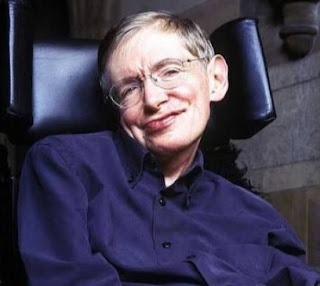Biography of Stephen William Hawking
 |
| Stephen William Hawking |
STEPHEN HAWKING (JANUARY 8, 1942 TO MARCH 14, 2018)
Stephen Hawking was a British scientist, professor and
author who performed groundbreaking work in physics and cosmology, and whose
books helped to make science accessible to everyone. At age 21, while studying
cosmology at the University of Cambridge, he was diagnosed with amyotrophic
lateral sclerosis (ALS). Part of his life story was depicted in the 2014 film
The Theory of Everything.


At the age of 21, Stephen Hawking was diagnosed with
amyotrophic lateral sclerosis (ALS, or Lou Gehrig's disease). In a very
simple sense, the nerves that controlled his muscles were shutting down. At the
time, doctors gave him two and a half years to live.
Hawking first began to notice problems with his physical
health while he was at Oxford—on occasion he would trip and fall, or slur his
speech—he didn't look into the problem until 1963, during his first year at
Cambridge.
For the most part, Hawking had kept these symptoms to himself. But
when his father took notice of the condition, he took Hawking to see a doctor.
For the next two weeks, the 21-year-old college student made his home at a
medical clinic, where he underwent a series of tests.


"They took a muscle sample from my arm, stuck
electrodes into me, and injected some radio-opaque fluid into my spine, and
watched it going up and down with X-rays, as they tilted the bed," he once
said. "After all that, they didn't tell me what I had, except that it was not
multiple sclerosis, and that I was an atypical case."
Eventually, however, doctors did diagnose Hawking with the
early stages of ALS. It was devastating news for him and his family, but a few
events prevented him from becoming completely despondent.
The first of these
came while Hawking was still in the hospital. There, he shared a room with a
boy suffering from leukemia. Relative to what his roommate was going through,
Hawking later reflected, his situation seemed more tolerable. Not long after he
was released from the hospital, Hawking had a dream that he was going to be
executed. He said this dream made him realize that there were still things to
do with his life.
In a sense, Hawking's disease helped turn him into the noted
scientist he became. Before the diagnosis, Hawking hadn't always focused on his
studies. "Before my condition was diagnosed, I had been very bored with
life," he said. "There had not seemed to be anything worth
doing." With the sudden realization that he might not even live long enough
to earn his PhD, Hawking poured himself into his work and research.
As physical control over his body diminished (he'd be forced
to use a wheelchair by 1969), the effects of his disease started to slow down.
Over time, however, Hawking's ever-expanding career was accompanied by an
ever-worsening physical state.
By the mid-1970s, the Hawking family had taken
in one of Hawking's graduate students to help manage his care and work. He
could still feed himself and get out of bed, but virtually everything else
required assistance.
In addition, his speech had become increasingly slurred,
so that only those who knew him well could understand him. In 1985 he lost his
voice for good following a tracheotomy. The resulting situation required
24-hour nursing care for the acclaimed physicist.
It also put in peril Hawking's ability to do his work. The
predicament caught the attention of a California computer programmer, who had
developed a speaking program that could be directed by head or eye movement.
The invention allowed Hawking to select words on a computer screen that were
then passed through a speech synthesizer.
At the time of its introduction,
Hawking, who still had use of his fingers, selected his words with a handheld
clicker. Eventually, with virtually all control of his body gone, Hawking
directed the program through a cheek muscle attached to a sensor.
Through the program, and the help of assistants, Stephen
Hawking continued to write at a prolific rate. His work included numerous
scientific papers, of course, but also information for the non-scientific
community.
Hawking's health remained a constant concern—a worry that
was heightened in 2009 when he failed to appear at a conference in Arizona
because of a chest infection. In April, Hawking, who had already announced he
was retiring after 30 years from the post of Lucasian Professor of Mathematics
at Cambridge, was rushed to the hospital for being what university officials
described as "gravely ill," though he later made a full recovery.
On March 14, 2018, Hawking finally succumbed to the disease
that was supposed to have killed him more than 50 years earlier. A family
spokesman confirmed that the iconic scientist died at his home in Cambridge,
England.
The news touched many in his field and beyond. Fellow
theoretical physicist and author Lawrence Krauss tweeted: "A star just
went out in the cosmos. We have lost an amazing human being. Stephen Hawking
fought and tamed the cosmos bravely for 76 years and taught us all something
important about what it truly means to celebrate about being human."
Hawking's children followed with a statement: "We are
deeply saddened that our beloved father passed away today. He was a great
scientist and an extraordinary man whose work and legacy will live on for many
years.
His courage and persistence with his brilliance and humor inspired
people across the world. He once said, 'It would not be much of a universe if
it wasn’t home to the people you love.' We will miss him forever."
...with Manicle, it's all about you...






Comments